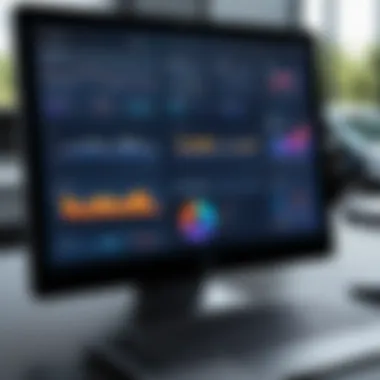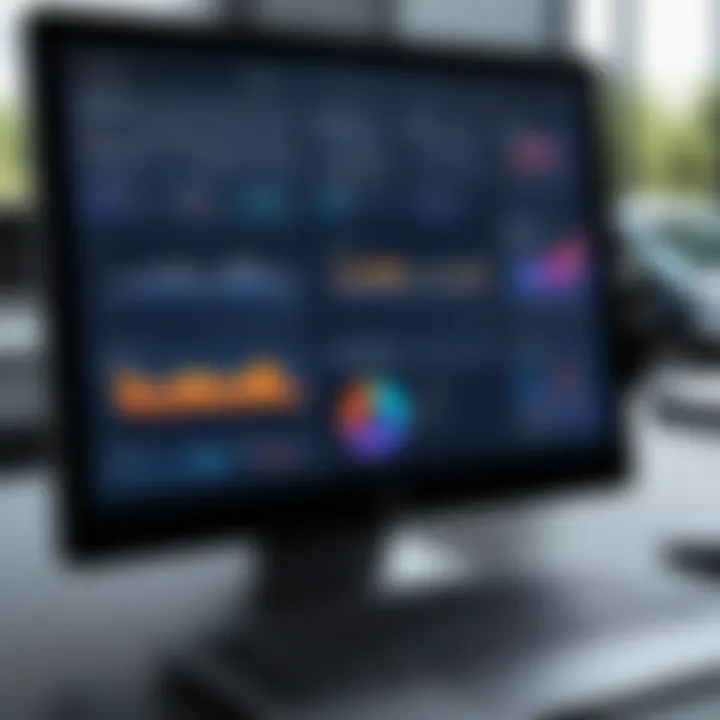Exploring Car Lot Software Programs: An In-Depth Analysis


Intro
The automotive retail landscape has evolved significantly in the last decade. This evolution is largely attributed to the integration of car lot software programs. These programs are not just tools; they are essential components that dictate how dealerships operate, interact with customers, and manage their inventories. As the industry continues to adapt to changing market conditions and consumer behaviors, the significance of selecting efficient software solutions becomes increasingly apparent.
In this analysis, we will examine the crucial aspects that dealerships should consider when choosing car lot software. Understanding the functionality, scalability, and overall impact of these programs enable dealers to optimize their operations and enhance customer engagement. By adopting a data-driven approach, businesses can streamline operations, which leads to better decision-making and improved performance.
Functionality
The functionality of car lot software is pivotal to its success. Each program varies in features and capabilities, and understanding these elements is crucial for selecting the right software for your dealership.
Overview of key features
Car lot software typically includes a range of essential features tailored to streamline dealership operations. Common features include:
- Inventory management: This allows dealers to track vehicles, including their status, location, and pricing.
- Customer relationship management (CRM): ID effectively manages customer data, interactions, and preferences, thus enhancing sales strategies.
- Sales and finance tools: These features enable dealers to process transactions efficiently and manage financing options for customers.
- Reporting and analytics: Through analytics, dealers can understand sales trends, customer behaviors, and overall performance metrics.
These features work in tandem to support dealership operations. A robust software program reduces time spent on administrative tasks, thus allowing sales staff to focus on customer interactions and closing deals.
How well the software meets user needs
User needs can vary widely across different dealerships. When evaluating car lot software, it is important to consider if it meets the specific needs and expectations of its users. This can be assessed through:
- User interface (UI): A clean and intuitive UI enhances user experience and reduces the learning curve.
- Integration capabilities: The software should integrate seamlessly with existing systems, such as website platforms and third-party applications.
- Customer support: Reliable customer support is essential; it ensures that issues can be resolved swiftly, minimizing downtime.
A program that aligns well with user preferences will lead to greater adoption and overall satisfaction.
Scalability
As the automotive market is often unpredictable, scalability in car lot software is essential. Dealerships need solutions that can adapt to their growth and changing needs.
Adaptability for growth
With the fluctuations in vehicle sales and inventory levels, dealerships should choose software that adapts as needs change. Scalability allows for increased functionality as the operation widens. Key factors to consider include:
- Cloud-based solutions: These often offer flexibility to scale up or down easily based on dealership requirements.
- Customizable modules: Many vendors offer additional modules that can be integrated into the existing software, allowing dealers to expand features as necessary.
Options for additional features or modules
Investing in scalable software ensures that as a dealership grows, the systems in place can continue to support enhanced operations. Additional modules can include:
- Advanced marketing tools: To enhance audience reach and engagement, dealership owners can add marketing functionalities.
- Mobile applications: To support on-the-go management and customer interactions.
Prolusion to Car Lot Software
In today's fast-paced automotive industry, car dealerships face numerous challenges that demand efficient operational tools. This is where car lot software comes into play, serving as a crucial component for enhancing dealership performance. With the integration of technology into daily operations, car lot software programs are no longer optional; they have become essential for modern automotive retail.
Car lot software provides various functionalities that streamline processes. This includes inventory management, customer relationship management, sales tracking, and financial reporting. Each of these elements plays a significant role in improving the overall effectiveness of a dealership.
Using advanced software solutions allows dealerships to harness data in real time. Consequently, businesses can make informed decisions that positively affect sales and customer satisfaction. The need for transparency and quick access to information highlights the relevance of adopting such technologies in a competitive market.
Ultimately, investing in car lot software can lead to increased efficiency and profitability. Understanding how these systems work is vital for professionals looking to optimize operations within their dealership.
Defining Car Lot Software Programs
Car lot software programs encompass a range of applications designed specifically for automotive dealerships. These systems enable dealerships to manage their daily operations more efficiently. The software often includes modules or components tailored to various departments, such as sales, service, and finance.
In essence, car lot software provides a unified platform for managing customer interactions and vehicle inventory. It often includes features for tracking vehicles from acquisition through to sale. Various programs offer customizable solutions that adapt to specific needs of different dealerships.
The primary goal of these software solutions is to enhance productivity. They facilitate better organization of information, leading to quicker response times for employees and customers alike. The automation of mundane tasks allows staff to focus on more strategic aspects of the business.
The Role of Software in Automotive Retail
The role of software in automotive retail cannot be overstated. As consumer expectations evolve, dealerships must adapt their operations accordingly. Reliable software solutions enable this transformation by providing essential capabilities that directly impact customer experience.


- Streamlined Processes: Software helps automate various functions. For example, it simplifies the processes of invoicing and inventory management.
- Data Insights: By gathering and analyzing data, dealerships can derive insights about sales trends and customer preferences. This data-driven approach supports strategic planning.
- Improved Communication: A well-integrated software system fosters better communication among teams. This ensures that everyone is on the same page.
"Investing in state-of-the-art car lot software equips dealerships to compete effectively in the current automotive landscape."
In summary, software solutions are fundamental to thriving in the automotive retail sector. They provide the tools necessary for efficiency and adaptability, which are crucial for success.
Key Features of Car Lot Software
Car lot software programs serve as vital tools for automotive dealerships. Understanding the key features of these programs helps dealerships enhance their operations. By focusing on specific elements, businesses can make informed decisions that drive efficiency and customer satisfaction.
Inventory Management
Efficient inventory management is crucial for any car dealership. The right software can automate tracking of vehicle stock, making it easier to manage incoming and outgoing inventory. This means sales personnel can access up-to-date information on available cars, helping them serve customers more effectively. Without such a system, dealerships often struggle with overstocking or understocking, resulting in lost sales opportunities.
Implementing an inventory management feature enables businesses to:
- Monitor vehicle status in real time.
- Integrate with various sourcing systems to streamline procurement.
- Generate reports that highlight fast-moving vs. slow-moving stocks.
Customer Relationship Management (CRM)
Customer Relationship Management functionalities are integral to effective dealership operations. A robust CRM system collects and analyzes customer data, facilitating personalized service. Understanding customer preferences allows the dealership to tailor communications and offers, ultimately leading to higher customer satisfaction rates.
Key benefits of a CRM include:
- Easier tracking of customer interactions and follow-ups.
- Streamlined service reminders and promotions.
- Enhanced customer loyalty and repeat visits.
Sales Tracking and Reporting
Sales tracking features offer insights into performance metrics. This data-driven approach enables dealerships to pinpoint successful sales strategies and recognize areas for improvement. By using reports to analyze sales trends, dealerships can adjust their tactics proactively.
Consider the following aspects:
- Visibility into daily, weekly, and monthly sales figures.
- Identification of top-selling vehicles and salespersons.
- Forecasting tools to predict future sales based on historical data.
Financial Management Tools
Financial management tools within car lot software handle budgeting, invoicing, and accounting processes. These systems help in tracking dealership expenditure against revenue and managing cash flow effectively. Integrating financial tools can reduce human errors and streamline reporting, presenting a clearer picture of the dealership's financial health.
Some features to look for include:
- Automated invoicing and billing processes.
- Financial forecasting capabilities based on sales and expenses.
- Integration with accounting software for comprehensive financial analysis.
"The capabilities of car lot software extend far beyond basic functions. They redefine operational processes, aligning them with modern retail expectations."
In summary, the key features of car lot software provide an array of functions that enhance operational efficacy, improve customer interactions, and support strategic growth. By investing in these technologies, dealerships can position themselves better in a competitive market.
Benefits of Implementing Car Lot Software
The integration of car lot software into dealership operations offers numerous advantages that can significantly enhance overall performance. As the automotive retail landscape continues to evolve, the necessity of adopting advanced tools becomes increasingly clear. Car lot software programs not only improve the efficiency of current processes but also facilitate better customer interactions and informed decision-making. These benefits can lead to increased sales and improved market competitiveness.
Enhanced Operational Efficiency
Operational efficiency is paramount in today’s fast-paced automotive market. Car lot software provides tools that automate various tasks such as inventory management, sales tracking, and reporting. This automation reduces the chances of human error, and allows staff to focus more on customer service and less on manual entry.
For instance, when a dealership implements software like VinSolutions or Dealertrack, employees can access real-time data regarding vehicle availability and customer information. They can quickly process transactions, and streamline daily operations. This leads to faster turnaround times, reduced operational costs, and ultimately higher profitability.
Additionally, the software can alert management about low inventory levels or upcoming scheduled maintenance, thereby preventing potential losses. Efficient management of these tasks results in a smoother workflow, helping dealers adapt quickly to changing market conditions.
Improved Customer Satisfaction
Customer satisfaction is a crucial factor in retaining clientele and attracting new business. Implementing car lot software can dramatically enhance the customer experience. Programs often include CRM functionalities that help dealers maintain detailed records of customer interactions and preferences.
By utilizing software tools like HubSpot or Salesforce, dealerships can personalize their marketing and communication efforts. For example, if a customer shows interest in a specific vehicle type, the dealership can send targeted promotions or updates on relevant inventory. This level of personalization not only strengthens customer relations but also creates a sense of loyalty.


Furthermore, many software solutions offer enhanced communication features, such as chatbots or customer service portals, which ensure immediate assistance. This responsiveness caters to the demands of tech-savvy consumers, significantly improving their overall experience with the dealership.
Data-Driven Strategy Development
In the age of information, data analytics plays a vital role in business strategy development. Car lot software equips dealerships with the ability to analyze sales trends, customer behavior, and operational performance. By leveraging data, dealership managers can make informed decisions aligned with actual market conditions.
For instance, software like Autosolutions and CDK Global incorporates analytics dashboards that visualize key performance indicators. This enables dealers not only to identify what is working well but also to pinpoint areas requiring improvement.
Furthermore, understanding customer preferences through data helps dealerships develop marketing strategies that resonate better with their audience. For example, sales campaigns can be tailored based on demographic insights, leading to more effective outreach and higher conversion rates. Essentially, data-driven strategies help dealerships not only stay competitive but also adapt swiftly to market evolution.
"Incorporating car lot software programs is not just a trend; it is a strategic move to future-proof automotive retail operations."
By embracing the benefits that come with car lot software, dealerships can ensure that they improve their operational frameworks, enhance customer satisfaction, and adopt a solid data-driven approach towards their business strategies.
Potential Challenges with Car Lot Software
While the advantages of implementing car lot software are significant, it is essential to recognize the challenges that dealerships may encounter. Addressing these issues is key to ensuring a successful integration and a smooth operation.
Integration with Existing Systems
Integrating new software solutions with existing management systems presents a notable challenge. Many dealerships already utilize a variety of tools for inventory, customer records, and sales tracking. Ensuring interoperability between these systems can be complicated. Failure to integrate seamlessly might lead to data silos, where information becomes fragmented and inaccessible. This can affect decision-making processes. Therefore, when selecting car lot software, dealerships must verify compatibility with their current systems. Additionally, technical support should be available to assist with any integration issues that arise post-implementation.
User Adoption Issues
User adoption is another primary obstacle. Employees may resist changing from familiar processes to new systems, fearing that the new software will disrupt their workflow. Training is crucial in mitigating this resistance. Working with software vendors who provide comprehensive user training can make a significant difference. It is also beneficial to involve staff in the selection process. This promotes a sense of ownership and accountability, encouraging a smoother transition. Onboarding strategies should include clear communication of the software’s benefits, tailored training sessions, and ongoing support during the adaptation phase.
Cost Considerations
Cost is perhaps the most decisive factor for many dealerships when selecting car lot software. The initial investment can be substantial, encompassing license fees, installation costs, and user training. Additionally, ongoing maintenance and support fees must be factored into the budget. Dealers must conduct thorough cost-benefit analyses to weigh potential gains in efficiency and sales against the expenses incurred.
"The long-term value of car lot software should outweigh the initial costs."
Moreover, exploring financing options can help ease short-term financial burdens. Understanding the total cost of ownership will lead to better financial planning and ensure that underestimating costs does not derail the implementation process.
Each of these challenges presents unique considerations for car dealerships. By addressing integration, user adoption, and cost considerations thoroughly, dealerships can effectively navigate the complexities of implementing car lot software.
Comparison of Top Car Lot Software Options
In the current automotive retail landscape, identifying the right car lot software is critical. Dealers are presented with numerous options, each promising to address the unique challenges faced in the industry. A comparison of the top car lot software options serves to clarify and illuminate these offerings.
When evaluating software solutions, several specific elements come into play. First, features such as inventory management, CRM capabilities, and pricing structures can differ vastly between programs. Understanding these aspects aids dealerships in making informed decisions that align with their operational needs and long-term goals.
Another essential consideration is the adaptability of the software to evolving market demands. Software that seamlessly integrates with existing systems while providing room for future scaling is vital. Thus, a comprehensive overview of available programs allows dealers to weigh these considerations against their individual requirements.
"Choosing the right car lot software can mean the difference between operational chaos and seamless efficiency."
Moreover, analyzing customer reviews and case studies of existing users provides insight into the practical benefits and setbacks of specific programs. This experience-driven approach complements technical evaluations, enhancing the overall understanding of how these systems function in real-world settings.
Overview of Leading Programs
There are several reputable car lot software solutions in the market today. These include but are not limited to DealerSocket, VinSolutions, and AutomotiveMastermind. Each of these platforms offers distinctive functionalities designed to cater to the diverse needs of dealerships.
- DealerSocket: Known for its comprehensive CRM features. It also assists in lead management and customer engagement.
- VinSolutions: Focuses on both inventory management and marketing automation, making it a robust option for dealers.
- AutomotiveMastermind: Offers predictive analytics, helping dealerships target the right customers effectively.
These programs exemplify how technology can enhance dealership operations and bolster customer relations, thus supporting higher sales volume and retention rates.
Feature Set Comparisons
A thorough examination of the feature sets available across these leading software options reveals important distinctions. Inventory management features can vary, impacting how dealerships track and manage their stock.
- DealerSocket: It offers real-time inventory tracking, which is essential for dealers maintaining numerous vehicles.
- VinSolutions: Users appreciate its integration with marketing tools to ensure that inventory levels align with customer interests.
- AutomotiveMastermind: Its predictive tools enhance inventory decisions based on customer behaviors.
Critically, effective customer relationship management systems differ too. While all leading programs provide basic CRM functionalities, the depth and usability of these systems vary substantially.


Pricing Structures
Understanding pricing structures is crucial as it tells dealers what to expect in terms of investment. These structures can be complex, often involving monthly subscriptions and additional fees for extra features.
- DealerSocket operates on a tiered monthly subscription model.
- VinSolutions provides various packages, leading to flexible pricing based on the needs of the dealership.
- AutomotiveMastermind tends to be more premium-priced due to its advanced analytics capabilities.
Case Studies: Successful Implementations
Case studies play a crucial role in understanding the effectiveness of car lot software solutions. They provide real-world examples that can illustrate the tangible benefits that dealerships experience after implementing such programs. Each case study serves as a narrative that highlights particular strategies, results achieved, and lessons learned. By analyzing these examples, dealerships can better assess the various software options available and what may work best in their unique environments.
Key Elements in Case Studies:
- Problem Identification: Understanding the specific challenges faced by dealerships before implementation is vital. Common issues include inventory inaccuracies and difficulties in customer management.
- Solution Implementation: This involves detailing the implemented software and processes. Effective case studies show not just what software was adopted, but also how it was integrated into daily operations.
- Results Achieved: Success metrics are critical. These may include increased sales volumes, reduced operating costs, or enhanced customer satisfaction ratings.
Improving Efficiency through Software
A case study focusing on improving efficiency through software often showcases how a dealership streamlined operations. For instance, a region-specific dealership might have faced significant delays in processing sales. After implementing a program like Dealertrack, they witnessed a decrease in transaction times by almost 30%.
This efficiency boost stemmed from automating various processes that were previously performed manually. With features like inventory management and digital paperwork, staff could reallocate their time towards customer-facing activities. Beyond just faster processing times, the dealership noticed a decline in errors, leading to improved data accuracy. Such improvements not only enhance day-to-day operations but also contribute to a more responsive customer service experience.
Enhancing Customer Engagement
Enhancing customer engagement through software implementation is another vital aspect illuminated in case studies. For example, a multi-location dealership group adopted VinSolutions to foster better relationships with customers. They integrated the Customer Relationship Management (CRM) system to better track interactions and preferences.
Utilizing targeted communication strategies, they were able to send personalized follow-ups to clients, significantly boosting customer retention rates. Evidence shows that about 50% of follow-up clients interacted again with the dealership compared to only 20% of those who did not receive any follow-up.
- Key Insights from this Case Study:
- Importance of personalization in marketing efforts.
- Utilizing data to inform engagement strategies leads to higher retention.
In summary, case studies provide valuable insights into how car lot software can transform dealership operations and customer interactions. They also highlight best practices and common pitfalls during implementation.
Future Trends in Car Lot Software
The automotive retail industry is rapidly evolving. As technology continues to advance, car lot software programs are adapting to meet the needs of dealerships and consumers. Understanding future trends in car lot software is essential for industry stakeholders. It provides insight into how these tools will shape the operations, drive efficiencies, and enhance customer experiences in the coming years.
Emerging Technologies in Automotive Retail
Emerging technologies are at the forefront of transforming the automotive retail landscape. Innovations like blockchain, Internet of Things (IoT), and augmented reality are gaining traction within car lot software solutions. Each of these technologies offers unique advantages:
- Blockchain can enhance security and transparency in transactions. It ensures tamper-proof records of vehicle history, which fosters trust between dealers and customers.
- IoT devices enable real-time tracking of vehicle conditions. This information can streamline inventory management by predicting maintenance needs and optimizing stock levels.
- Augmented reality tools allow potential buyers to visualize vehicles in their own space. This interactive experience can elevate customer engagement and improve conversion rates.
These technologies create opportunities for dealerships to leverage data more effectively. They pave the way for improved decision-making and increased agility in operations.
The Role of AI and Automation
Artificial Intelligence (AI) and automation are playing a pivotal role in the evolution of car lot software. AI can analyze large datasets, uncovering patterns and insights that help dealerships tailor their strategies. This can lead to:
- Personalized recommendations for customers based on their previous interactions or preferences.
- Predictive analytics to forecast sales trends and consumer behavior, ultimately driving smarter inventory choices.
Automation streamlines routine processes, such as data entry and report generation. This reduces human error and allows staff to focus on customer engagement and sales.
Incorporating AI and automation not only enhances operational efficiency but also significantly improves the customer experience. Dealerships can provide quicker responses and more relevant interactions, which are critical in today's competitive market.
"Staying ahead of the curve with technology is key to surviving in the automotive retail industry."
Closure
The conclusion of this article highlights the essential role that car lot software plays in the automotive retail industry. It serves as a culmination of the insights shared throughout the previous sections. Recognizing the software's potential is not merely about adopting technology; it is about embracing a strategic tool that enhances business operations and customer relationships.
Car lot software provides several significant benefits. First, it improves operational efficiency by streamlining various processes such as inventory management and sales tracking. This ultimately leads to increased productivity and reduced error rates in daily tasks. Furthermore, the adoption of this software can greatly enhance customer satisfaction, as dealerships can respond more quickly to client needs and inquiries. By offering a more tailored experience, businesses can build lasting relationships with their customers.
Considering the challenges associated with software integration, it is critical to evaluate costs and potential user adoption issues. Engaging employees early in the process, providing adequate training, and ensuring compatibility with existing systems can mitigate these concerns. The investment in such technology has a tangible return when executed thoughtfully, leading to a more data-driven strategy for future operations.
"The right car lot software enables dealerships not just to survive, but to thrive in a competitive marketplace."
Final Thoughts on Car Lot Software
Car lot software is integral to modern automotive retail. It provides tools that can transform how businesses operate. As the market evolves, dealerships must stay adaptable. Investing in the right software program can yield significant rewards in efficiency, customer engagement, and data utilization.
Future advancements, especially in artificial intelligence and automation, promise to add even more value to these software solutions. Dealerships must keep pace with these developments to remain competitive. The intersection of technology and automotive retail is a space filled with potential, and those who embrace it can expect to reap the benefits.







